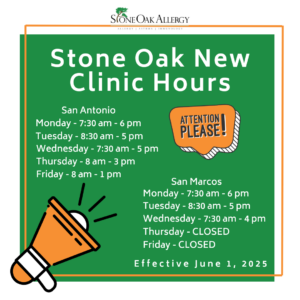March 22, 2023
Navigating San Antonio’s Allergy Minefield: Top Tips for Raising an Allergy-Prone Child

Childhood is one of the most magical times in a parent’s and child’s lives. However, for children with allergies, it can be a stressful and scary experience. As a parent, you may constantly worry about your child’s exposure to allergens and how to keep them safe. If you are raising an allergy-prone child in San Antonio, many resources and tips are available to help you navigate this minefield and keep your child safe.
Understanding Allergies
Allergies occur when the immune system reacts to a foreign substance, such as food, dust mites, or pollen. The immune system mistakes these substances as harmful and releases antibodies to fight against them. This response from the immune system causes allergic reactions, which can range from mild to severe. Allergies can be hereditary, but they can also develop even if neither parent has had allergies. The most common types of allergies are environmental and food allergies.
What is the most common allergy in San Antonio?
San Antonio has a high prevalence of environmental allergens such as mold, grass, and pollen. Mold is present year-round, although the peak seasons are summer and fall. Grass allergies begin in March and tend to alleviate in September. Trees are also huge pollinators during spring. Oak season is seen from the end of February and peaks in April. Elm trees begin to pollinate in February and release pollen late into March. Children’s lives are certainly impacted during these times, as they become exposed to high pollen counts during recess and outdoor activities. Due to the longer allergy seasons experienced in San Antonio, children with seasonal allergies rarely get a break.
Parenting Your Allergy-Prone Child in San Antonio
If you have a child with allergies, it’s important to educate everyone in your child’s life about their allergens and provide them with an action plan in case of an allergic reaction. Start by setting up a meeting with your child’s school and teachers. Make them aware of your child’s allergens and work with them to develop an action plan that will help keep your child as safe as possible during the school year. It’s also important to inform your child’s friends and their parents about their allergens and what steps to take in case of an allergic reaction.
What resources are available for families to educate themselves and their children about food allergies?
If your child has food allergies, it’s important to educate yourself and your child about their allergens. Many resources are available to help, including online support groups and educational websites. Food Allergy Research and Education (FARE) is an excellent place to start. FARE offers information to help manage food allergies, recipes that are Top 9-friendly, and even an app to help you shop for allergy-friendly foods.
Allergy Treatment Options
Daily allergy management can look different for every parent, depending on their child’s allergy. For food allergies, it can include packing a home lunch filled with nutrient-rich and allergy-friendly foods and making sure their school has an epinephrine auto-injector available should it be needed. For environmental allergies, daily antihistamines and nasal sprays can help reduce symptoms. If you use an allergy-inducing food in your home, sanitize any surface with which food comes into contact to avoid cross-contamination. For environmental allergies, it’s recommended that your child changes their clothing and showers as soon as they come home to limit the number of allergens they can spread through the home. Washing off any allergens on their skin or hair is also important. A HEPA air filter is also a great addition to any home with allergy sufferers.
For more advanced steps to treat them, speak with your child’s allergy specialist to develop a treatment plan for you and your family. Your child’s doctor will be able to support and guide you to be sure that allergies stay in check. Treatment plans can range from medical procedures, daily medications, and for more severe cases, immunotherapy.
Tips for Managing Allergies on a Daily Basis
Managing allergies daily can be challenging, but several tips and tricks can make it easier. Here are some tips for parents raising allergy-prone children in San Antonio:
- Know your child’s triggers: Understanding what triggers your child’s allergies is key to managing them. Keep a diary of what they eat, where they go, and what they do to help identify their triggers.
- Teach your child how to avoid their allergens: Educate them on what they need to avoid and how to avoid it. For example, if your child is allergic to dust mites, keeping their room clean and dust-free is important. If allergic to peanuts, teach them always to ask if a dish contains peanuts before eating it.
- Make sure your child’s teacher is aware of their allergies: It’s important that your child’s teacher is aware of their allergies and knows what steps to take in case of an allergic reaction.
- Have a plan in place: In case of an allergic reaction, it’s important to have a plan. This plan should include what steps to take, who to contact, and what medications to administer.
- Stay prepared: Always carry your child’s epinephrine auto-injector, medications, and any other necessary items with you in an emergency.
Resources for Families with Allergy-Prone Children
As a parent, you may feel overwhelmed and in need of support when it comes to managing your child’s allergies. Thankfully, there are many amazing resources available to help. Here are some resources that can help you educate yourself and your child about food allergies:
- Food Allergy Research and Education (FARE): FARE is a nonprofit organization dedicated to improving the lives of people with food allergies. They provide educational resources, advocacy, and support for families with food allergies.
- Kids with Food Allergies (KFA): KFA is a division of the Asthma and Allergy Foundation of America. They provide support, education, and advocacy for families dealing with food allergies.
- Allergy and Asthma Network: The Allergy and Asthma Network provides educational resources, advocacy, and support for people with allergies and asthma.
- Local support groups: There are many local support groups for families dealing with allergies. These groups can provide support, advice, and a sense of community for allergy families.
By utilizing these resources, parents can learn more about allergies, find support, and connect with other families dealing with similar issues.
Conclusion
Raising an allergy-prone child can be challenging, but with the right knowledge, support, and resources, parents can help their children manage and control their allergies and enjoy their childhood carefree. Understanding allergies, educating others, supporting your child’s immune system, and taking proper precautions can make all the difference in helping your child live a healthy and happy life. Remember to consult with your child’s doctor and allergist to come up with a treatment plan that is right for your family and to stay vigilant in managing their allergies on a daily basis.
